Trans is the New Communist: The Latest Tiresome Culture War
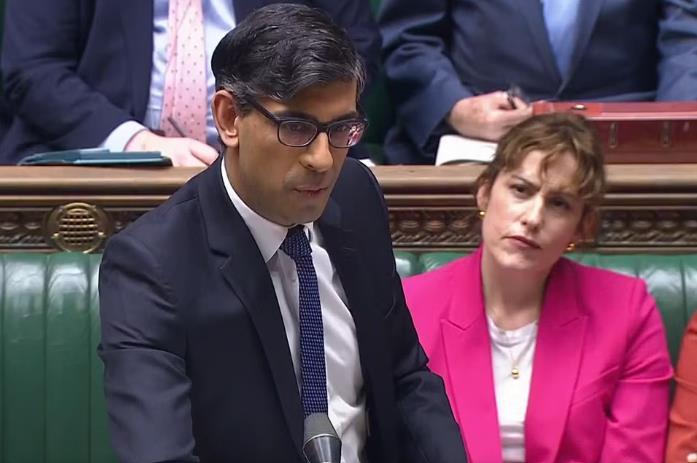
The growing weaponisation of trans people in the current political climate comes at a human cost.
faced backlash for a cheap jibe made in a parliamentary exchange with opposition leader Sir Keir Starmer, witnessed in person by the mother of Brianna Ghey, a 16 year-old transgender girl who was murdered a year prior.
British Prime Minister Rishi Sunak has been criticised for his comments regarding transgender people on multiple occasions within the past 12 months.
This happened most recently in February, as the Prime Minister
Sunak refused to apologise to Ghey’s family – in spite of demands from father Peter Spooner – and later defended this remark as "not controversial", a sentiment that feels increasingly resonant –regardless of which side of the argument you lie – amid a political and social climate in which the usage of trans people as a pawn is increasing exponentially both in the UK and worldwide.
Look at the stances taken by past Conservative Prime Ministers, for example. Theresa May has remained outspoken in her support for trans people and has even, since her time serving as Prime Minister, spoken to LGBTQ+ news sources of the risks and dangers trans people are facing as a result of the "sliding back" that's taken place in recent years.
confused, but trying
confused, but trying
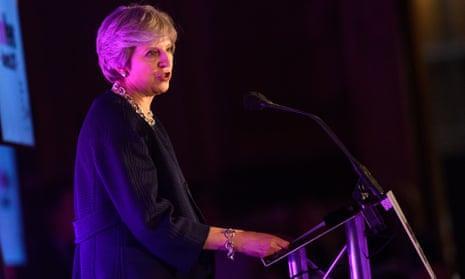
Before her, David Cameron pledged to combat the prejudice trans people were facing over a decade ago and staunchly vowed to "never validate" the opposing stance.
So what's changed? Why have mainstream press articles about trans people in the UK risen from the sixty in 2012 to the over seven thousand in 2022?
These are two examples of institutionalised support for trans people from the British government that existed a decade ago that is evidently dwindling today.
It can be argued that it largely stems from social media discourse that has escalated in recent years from concerns surrounding the safety of women to something of a witch-hunt that has seen an increase in transgender deaths worldwide to both violence and suicide – Brianna Ghey's story is tragically one of many examples of the human cost of an increasingly dangerous culture war.
This discourse was further amplified in 2020 by J.K. Rowling, who initially took issue with the trans-inclusive wording of an article that referred to "people who menstruate". Upon backlash at the time, Rowling defended her view but also made clear to state that she "knew and loved" trans people and even that she'd "march with [them] if [they] were discriminated against on the basis of being trans".
confused, but trying
Fast forward to 2024, she's proclaiming "arrest me", as part of an 11post thread on X (formerly Twitter) dedicated to "exposing" the names and photographs of a wide array of transgender women and branding them men, amid new hate crime legislation coming into effect in Scotland, aimed to protect transgender identity among other minority groups.
Culture wars feed on controversy, rather than striving for a solution.
Not only does rage benefit many - financially or politically - but targeting the real root of this particular discourse would require acknowledging that, as 92% of the defendants in domestic abuserelated prosecution in 2020, the patriarchy is a far bigger threat to the safety of women – which appears to be the main point of concern in the discussion – than trans people.
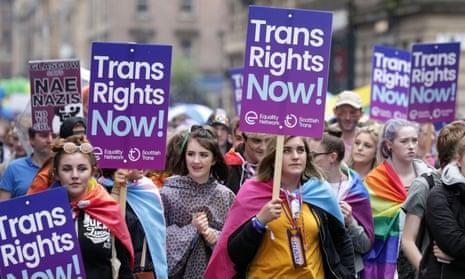
Protestors for trans rights in Scotland, before the hate crime legislation came into effect earlier this year.
But that's not a profitable rhetoric when those in power, or those who want power, are often those who benefit directly from the patriarchy.
And so trans people become the problem - the latest in a long line of political pawns used to amplify moral panic. It's a common but evidently effective tactic that manifests itself in evolving ways: the US managed to amplify the fear of Communism for decades to justify financially backing civil wars and terror across the globe to protect the status quo from a threat that was never anywhere near as threatening as so fervently broadcasted.
confused, but trying
Fast forward to 2024, she's proclaiming "arrest me", as part of an 11-
post thread on X (formerly Twitter) dedicated to "exposing" the names and photographs of a wide array of transgender women and branding
them men, amid new hate crime legislation coming into effect in Scotland, aimed to protect transgender identity among other minority groups.
And so trans people become the problem - the latest in a long line of political pawns used to amplify moral panic. It's a common but evidently effective tactic that manifests itself in evolving ways: the US managed to amplify the fear of Communism for decades to justify financially backing civil wars and terror across the globe to protect the status quo from a threat that was never anywhere near as threatening as so fervently broadcasted.
Culture wars feed on controversy, rather than striving for a solution.
Not only does rage benefit many - financially or politically - but targeting the real root of this particular discourse would require acknowledging that, as 92% of the defendants in domestic abuserelated prosecution in 2020, the patriarchy is a far bigger threat to the safety of women – which appears to be the main point of concern in the discussion – than trans people.
So, it's difficult to see where, when or how this particular culture war ends, and it's hard to blame anyone for feeling pessimistic about the increasingly bleak political climate. As trans people face growing danger and hostility, even from our own government, media literacy and critical thinking gain growing importance.
But that's not a profitable rhetoric when those in power, or those who want power, are often those who benefit directly from the patriarchy.
Culture wars thrive on unquestioned attention, and with social media becoming more prominent by the minute, attention is easier to come by than ever. It’s becoming increasingly important that we choose how we spend our screentime wisely.
Palestine Unfiltered: The Voices Silenced by Social Media Giants
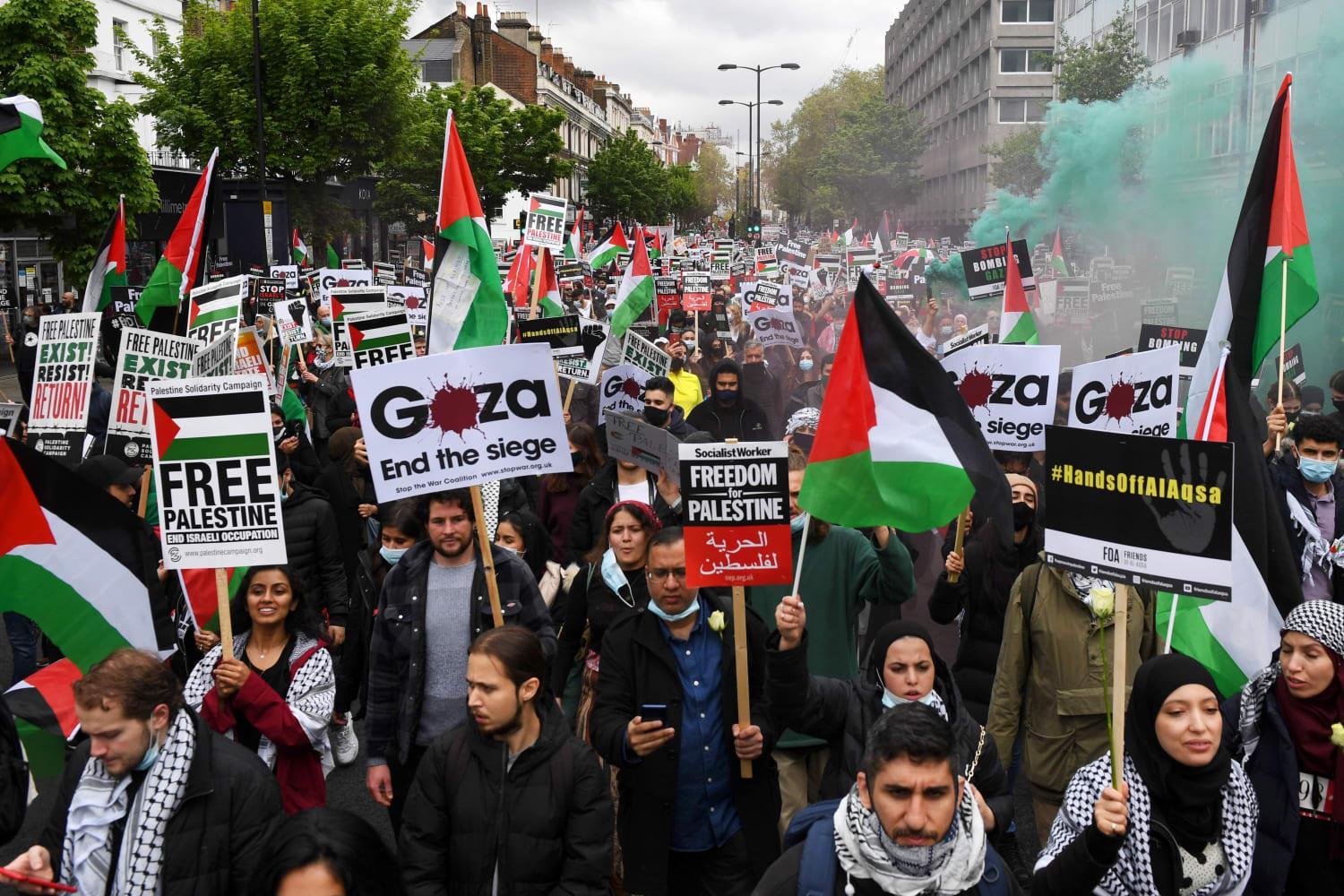
An insight into how social media algorithms affect what we see of the Israeli-Palestinian conflict.
In the current age, social media can very easily be considered the number one platform for raising awareness of a wide variety of social issues. Anybody can do this: from celebrities to politicians to the regular person at home.
In the case of Nemah Hasan – a Palestinian Canadian musician who goes by the name Nemahsis publically, and went viral for her 2021 single, "What If I Took It Off for You?", about attitudes towards Muslim
women who wear the hijab – social media and social activism have always gone hand in hand; claiming that 88% of her music is about “identity crisis i’ve developed as a refugee Palestinian living in the west”. This became further ramped up towards the end of 2023, when
Israeli-Palestinian tensions escalated to the point that, as of May 2024, over 31,000 Palestinians are estimated to have been killed.

confused, but trying
Consequently, in November 2023, she shared that her label terminated her contract due to her pro-Palestinian stance and has, in the months that have followed, continue to release music regardless and raise further awareness, despite an interesting roadblock.

Shortly after being dropped, Hasan began to note that Instagram – the platform on which she was posting a large majority of her content –was restricting her content. Her content since has revolved around finding clever ways to circumvent the algorithm, such as posting TikTok-esque dances with pro-Palestine messages and sharing Palestinian symbolism without certain trigger words or phrases.
In December 2023, Human Rights Watch confirmed that Meta was in fact systematically ‘shadow-banning’ pro-Palestinian voices on its platforms – including but not limited to Facebook, Instagram and Hasan has since used her platform – consisting of 355,000 Instagram followers, for example – to shine a light on the reality experienced by Palestinian people, sharing ways to support them and even hosting events in which all money raised was donated to Palestinian refugee camps.
This begs a concerning question: if Hasan, an upcoming musician with over 100,000 monthly listeners and 355,000 Instagram followers, can be censored by these social media platforms, what else is being censored by the algorithm?
confused, but trying
An example of symbolic algorithm-boosting carried out by Hasan within her TikTok comments section.
confused,
but trying gap between what they’re deemed as ‘supposed to see’ by those with control over the algorithm, and a more accurate reflection of reality.
WhatsApp, actively seeking out to suppress Palestinian content so that posts that contain a pro-Palestinian sentiment do not receive the same engagement as posts that do not. This is, according to Human Rights Watch, a trend that has been taking place for years across Meta’s social media platforms, but with the Israeli-Palestinian conflict receiving increasing media and social media attention over the past six months, users are becoming increasingly aware of the broadening
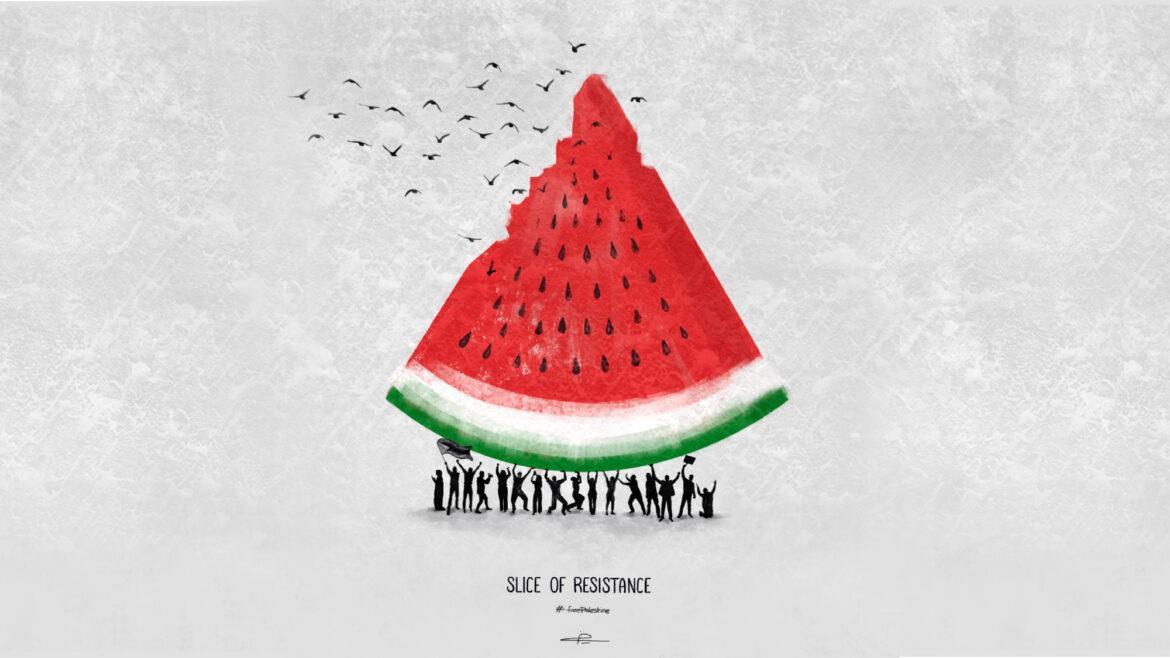
As such, people such as Hasan are finding ways around it. For one, the watermelon emoji has become synonymous with solidarity with Palestine, partially due to it sharing its colours with the Palestinian flag.
The big take-away point from these Human Rights Watch findings, as well as the activism of people such as Hasan, is to treat all social media content with caution. The Israeli-Palestinian conflict is an example of an immensely complicated geopolitical issue dating back decades, and it is essential to consider that the big companies behind some of the biggest social media platforms are actively inhibiting the platforming of Palestinian voices that would – at the very least –provide a more balanced media narrative in an age where the media has the biggest reach and is the biggest method of raising awareness. Media literacy is, once again, proving to be incredibly important.
Picture via muslimobserver.com
confused, but trying

5 Things I Wish I’d Been
Told Before My Year
Abroad: A Neurodivergent Perspective
Because we don’t all go in as social butterflies! You’re doing a year abroad? That’s so exciting!
At least that’s the common reaction I would get when bringing mine
up to friends and family. It's a once-in-a-lifetime opportunity to fully
immerse yourself into a brand-new culture, meet new people, experience new things and have the best time!
Don’t get me wrong - much of this is true, and overarchingly representative of how you’ll likely feel coming out of your year abroad.
However, as with most things, the idea that a year abroad is this straight-forward is a highly neurotypical narrative. At least from my personal experience, going through the year abroad as someone who is neurodivergent undoubtedly offered a different experience to this supposed 'norm'. Not better or worse, but certainly different.
It's easy to read all these articles beforehand to prepare yourself and get swept up in the idea that everything will be different – a break from the stresses of university and home life. Unfortunately, some things
are the same before and after uprooting your life to another country, and some of the differences aren’t going to be quite so comforting. As such, I hope to provide a 'year abroad prep' list that's a little more grounded (while still hopefully providing an optimistic outlook on the year ahead, so stay with me!) for those who are concerned about not necessarily fitting the stereotypical, more typically extroverted 'year abroad type'.
confused, but trying
You probably won’t have the same experience that you see online –and that’s okay!
A finite time frame on your year abroad means it's easy to feel as though time is being wasted if you're not constantly out doing something - and it's increasingly common in the age of social media especially to feel as though your experiences are somewhat lesser than those around you. Many will have actively set out to document as much of their year abroad experience on social media as possible for friends and family but remember these are still just the highlights.
doesn't mean you're not still having an incredible experience. It's easy to fall into the trap of comparing yourself to everybody around you and thus downplaying your own experience, but social media is all just for show!
Now that I’ve eased you in…
You’re on your own.
They present an idealised and, ultimately, an unrealistic perspective of how a year abroad (or any experience really!) actually is. So not having this exact experience
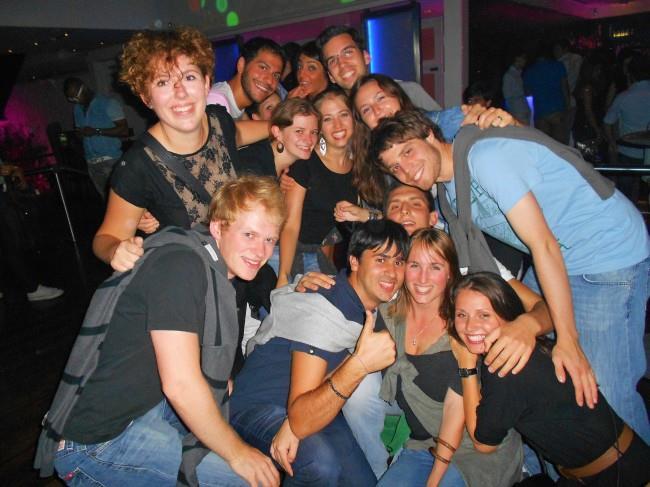
This may seem obvious, and I remember all too well the sinking feeling of worrying about how lonely the year abroad was going to be, away from family and friends. This in itself is certainly a valid concern to have (though it gets better, I promise!), something that hadn't really sunk in for me was how much I'd have to do by myself that I hadn't done before. With this I'm mostly referring to life admin - in a postBrexit world, visas are probably right at the forefront of most British exchange students' minds in the leadup to a year abroad, so to some extent this is probably not an alien concept, but I didn't really think about how once I arrived in Spain it would keep going.
confused, but trying
It’s a seemingly constant stream of often repetitive but largely overwhelming life admin, and while there will be support systems in place to try to assist as much as they can, I found that, in the years that directly followed Brexit meaning a lot of these processes and procedures were very new, these support systems are fairly limited, and information can be hard to come by.
come out of, tail between your legs, wondering if you're as good at the language as you previously thought you were. There will be moments where your mind goes completely blank, and you have absolutely no idea what to say or do as a local cashier stares blankly back at you. It's an inevitable, some may even say essential, part of a year abroad, and it can definitely play on your mind, but it happens. Don’t dwell on it too much, you’re there for a year!
In that sense, you're on your own in a way many students embarking upon a year abroad won't have been before. Take advantage of the help you can get and try to keep organised and on top of the important life admin stuff, even if it's scary!
Be kind to yourself!
With these points in mind, it's important to remember how much of an achievement getting through a year abroad is. Simply getting through a year abroad is no mean feat and, though it's easier said than done, it's so important to be kind to yourself as you go through it. And don't sweat the small stuff! The studying part of a study abroad experience, for example, often ends up a little neglected in discussions, and while I'm not about to encourage you to neglect your Something I've not seen anybody talk about is how humbling a year abroad can be. You can do all of the language prep you like, but you can't prepare for everything, and there will be encounters that you
You will be humbled.
confused,
but trying studies, it can be very easy once you're there to feel overwhelmed with the stress of studying in a language that you may not be fluent in, and you are still ultimately studying at a university. It can be demanding but remember the bigger picture and that you're here for the whole experience. Treat yourself, give yourself that day off, be kind to yourself!
It’ll all be worth it.

This is the point I cannot stress enough. There will come a point where you're looking back on your year abroad and you're not worrying about that essay or presentation you needed to do, or the time you were hysterically trying to figure out how to pay in a Spanish banking form at the police station as part of a six-month long visa process, or even the worries of homesickness. Instead, with any luck, you'll be so glad you did it.
Because ultimately, while the experience may not be the same for everybody - and there are certainly unique challenges that neurodivergent people face going through it - the cultural immersion and life experience gained simply from getting through a year abroad, from overcoming the challenges it brings, is invaluable. So, on your hardest days out there, try to remember that eventually you’ll be looking back feeling the experience was worth the while.
Eurovision Song Contest:
No,
Europe Doesn’t Hate
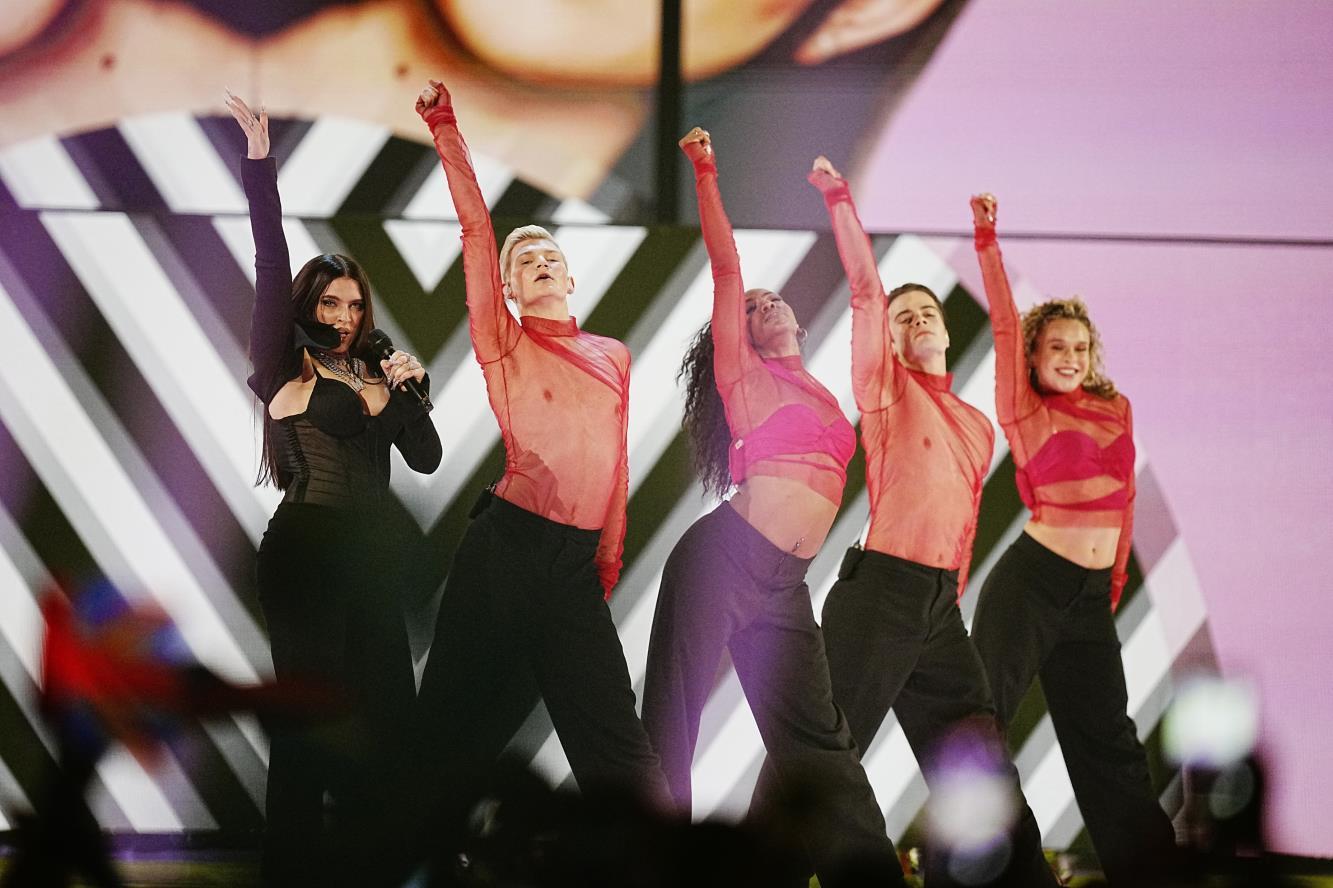
Debunking an age-old Eurovision myth…
It’s that time of year again – on 11th May the Grand Final of the 68th Eurovision Song Contest will take place in Malmö, Sweden.
across all sorts of unrelated programming: “It’s all rigged!”, “Europe hates us!”, “Why do we bother taking part, we’re not in Europe anymore!”.
At best it’s a tiresome, repetitive rhetoric with strong xenophobic undertones, and while there is an argument to be had surrounding a certain element of politics involved in the voting, within the argument seems to be an embedded belief that the United Kingdom should be rewarded just for showing up. That, somehow, just by having an act on stage, we’re superior to any participating country, let alone every country as those who think we should win it seem to believe.
Because, yes, with the turn of the 21st century, British results in Eurovision have dropped off dramatically. Once one of the biggest powerhouses in the contest, winning five times and finishing in 2nd place an astonishing fifteen times before 2000, as the contest began to grow in numbers substantially, the results the UK achieved in the contest worsened – going as far as achieving the dreaded “nul points” And with it, undoubtedly, will come the same old discourse we hear year after year in social media comment sections and from pundits
confused, but trying
Us
confused, but trying unpopularity, and deduce that therefore, the UK’s are bad unjustly, because Europe hates us.
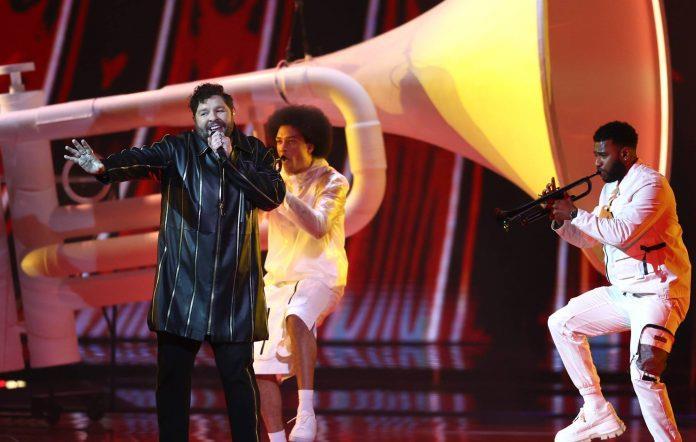
James Newman, who represented the United Kingdom with “Embers” in 2021, finishing in dead last with zero points. It would be easy to look at this drop in form, as well as certain British geopolitics that could certainly be deemed as justifying potential unpopularity
This argument, however, ignores the tiny aspect to consider of the songs and performances we were submitting to the contest, for one. When we have actually sent songs up to scratch with the rest of the pack, we have been awarded with good to decent results.
Most notably, Sam Ryder’s “Space Man” in 2022 was a powerhouse performance that earned him 2nd place and, more importantly, kickstarted a career that has thus far seen him release a number 1 album in the same year, as well as three UK top 40 hits and bringing Eurovision to Liverpool as the United Kingdom hosted the contest for the first time in 25 years in place of actual winners Ukraine. The reality is that Eurovision is not only the night of camp, silly fun anymore: it is, to an extent, a serious platform for musicians to launch or further their careers, and this is a trend we are seeing more and more of as the years go by. on two occasions, first in 2003 with Jemini’s ill-fated “Cry Baby”, and again only in 2021 with James Newman’s “Embers”.
confused, but trying
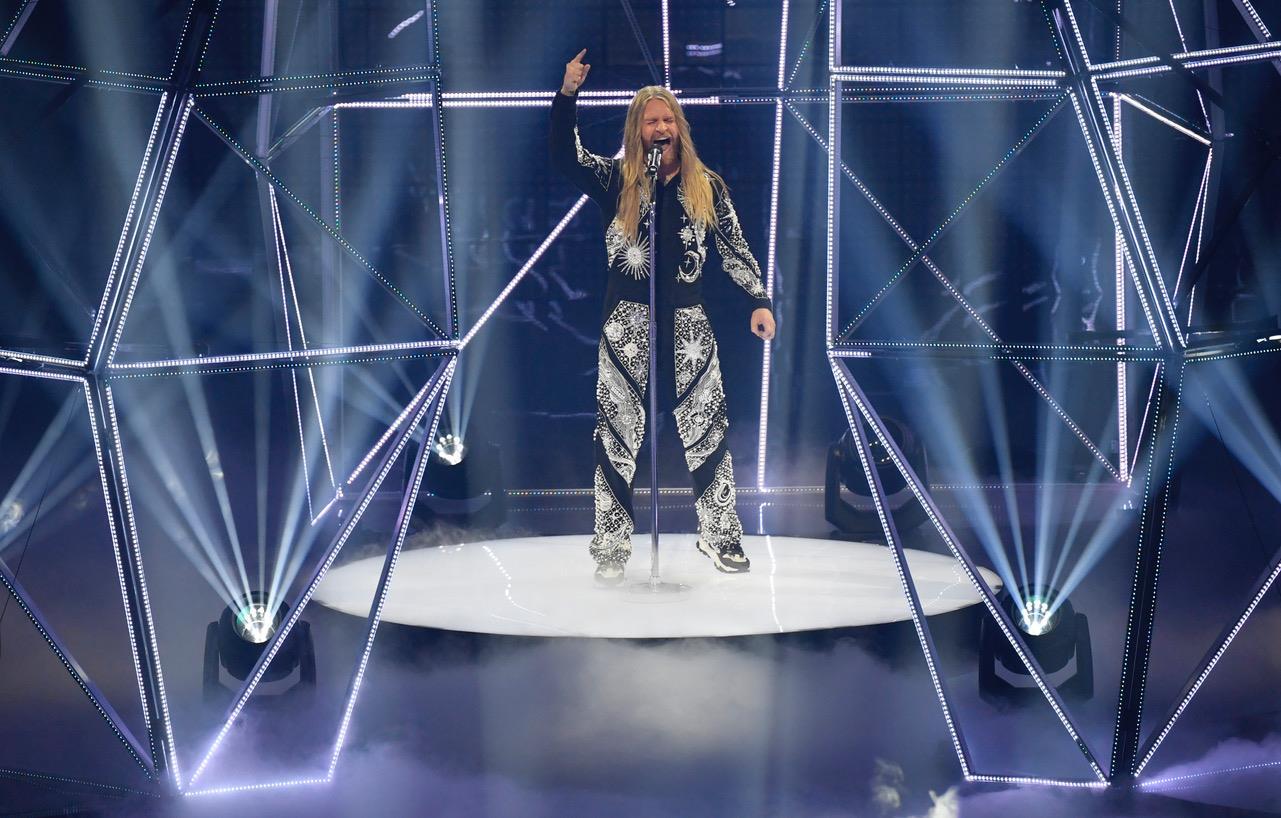
Sam Ryder launched his career at Eurovision in Turin in 2022 and has subsequently gone on to perform at the Coronation.
Over the past few years alone, Eurovision has seen winners Måneskin for Italy and Duncan Laurence for the Netherlands breakthrough with international success, and even songs that haven’t fared particularly well in the contest have gone on to be mainstream successes, such as Armenia’s Rosa Linn, who finished in 20th place in the same year as
Sam Ryder, but her song “Snap” is one of only two Eurovision songs ever to reach one billion streams on Spotify having gained substantial traction on TikTok after the contest.

With this in mind, the contest isn’t as simple as just ‘send something half-decent equals good result’ anymore, because, for the most part, every participating country is taking the contest seriously, investing substantial
confused, but trying
This makes the 2024 contest a particularly interesting one, as Olly Alexander of former Years & Years fame will be flying the British flag in Malmö, performing “Dizzy”. It’s the first time the United Kingdom will be represented by an artist who has previously had a UK top 10 hit in the ten years prior to participation (sorry Bonnie Tyler…) since Blue in 2011.

With “Dizzy”, we head into the contest in 10th place in the odds to win it (which can be followed live here). Leading the pack currently is Croatia – who have never placed in the top 3 at Eurovision – and Switzerland – who haven’t won it since Céline Dion in 1988 – which doesn’t do wonders for the argument that the same countries always win it all the time.
The contest is an unpredictable beast, and ultimately, more than anything, just a bit of fun that – for the majority of people – begins and ends on that one Saturday night in May. For some of the performers, the result achieved on the night is irrelevant, as proven by the subsequent success of Rosa Linn. And with the geopolitical landscape becoming increasingly concerning as the years pass, maybe it’s not the worst thing in the world to have a harmless bit of fun that connects us to the rest of Europe (and Australia. Don’t ask.) –so let’s not allow being a poor sport to burn even the silliest of bridges to the rest of the world. substantial money and substantial time into perfecting their song and performance. The UK taking the contest seriously, as it has begun to shift towards with the beginning of this decade, simply puts us on an even playing field.















